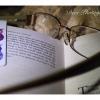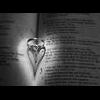Search the Community
Showing results for tags 'books'.
-
Towards the end of the 19th century, book lover and former British prime minister W.E. Gladstone was worried: Britain could one day be drowning in books. He predicted there could soon be 60,000 books a year being published. How would libraries store so many books? And how would they be organised? In 2012 The British Library received 3 million new books a year. Somehow we are coping. But such was Gladstone’s concern in 1890 that he published a pamphlet: On Books And The Housing Of Them. In it he gives detailed advice on how to build your private library, what size shelves should be and how your books should be organised. And he had a radical solution to the problem of having too many books: A book cemetery. But there’s more than the humour of hindsight evoked by this short pamphlet. At a time society is looking once more at the future of books, the future of libraries, and the birth of the Google Library (an attempt to digitise every book ever published), this proves to be a surprisingly timely publication by a 19th century bibliophile. Take this quote for example: “Noble works ought not to be printed in mean and worthless forms, and cheapness ought to be limited by an instinctive sense and law of fitness. The binding of a book is the dress with which it walks out into the world. The paper, type and ink are the body, in which its soul is domiciled. And these three, soul, body, and habilament, are a triad which ought to be adjusted to one another by the laws of harmony and good sense.” An explanatory preface in front of Gladstone’s booklet for today’s reader would be useful (it’s a free download from Gutenberg books or the Kindle library) but it seems that he was writing at a time when copyright laws between American and the USA were being ironed out and cheap printing was heralding a greater democracy in book publishing and book ownership. Gladstone warned: “When artificial fetters are relaxed, and printers, publishers, and authors obtain the reward which well-regulated commerce would afford them, then let floors beware lest they crack, and walls lest they bulge and burst, from the weight of books they will have to carry and to confine.” He has no doubts over the importance of the book: “Books are the voices of the dead. They are a main instrument of communion with the vast human procession of the other world. They are the allies of the thought of man… In a room well filled with them, no one has felt or can feel solitary.” But he was having serious concerns about how libraries in the future would cope with so many books. How could you afford to have them all bound? (it seems Victorians paid to have books and periodicals bound anew when they bought one). How would you build rooms big enough and shelving long enough to store them all? And how would you organise the millions of books so you could quickly find the one you wanted? Gladstone spends much time on the physical dimensions for shelving (could he have ever dreamed of millions of books stored on a hard disc measuring just a few inches across, or stored on a ‘cloud’?!). He writes: “First, the shelves must, as a rule, be fixed; secondly, the cases, or a large part of them, should have their side against the wall, and thus, projecting into the room for a convenient distance, they should be of twice the depth needed for a single line of books, and should hold two lines, one facing each way. Twelve inches is a fair and liberal depth for two rows of octavos.” That a leading politician should bother to take time out to advise others how how wide to make their library shelves is a wonderful example of how much importance he placed on books. There is also much discussion on how books are categorised – A to Z or by subject? And he asks “whether the arrangement of a library ought not in some degree to correspond with and represent the mind of the man who forms it?” Surely still a question relevant to how people store books on their Google cloud or Kindle library? Finally he discusses – and he acknowledges how sensitive this subject will be – what to do with all those books and periodicals that you hardly ever read and you don’t want clogging up your bookshelves. His solution is a book cemetery – an underground storage facility but likened more to storing vintage wine in vats than disposing of bodies in a graveyard. “Undoubtedly the idea of book-cemeteries such as I have supposed is very formidable” he writes. “It should be kept within the limits of the dire necessity which has evoked it from the underworld into the haunts of living men. But it will have to be faced, and faced perhaps oftener than might be supposed.” So that will be the ‘archive’ button on my Kindle then. Since this booklet is free to Kindle users, I’d urge everyone to download it and read it. Gladstone's hope was that his measurement for private libraries would “prevent the population of Great Britain from being extruded some centuries hence into the surrounding waters by the exorbitant dimensions of their own libraries.” He probably failed to save me from the impending collapse of my house from the hundreds of books on my shelves but perhaps those architects of the virtual library at Google might find his advice helpful. * I should add that Gladstone had an impressive library of his own – it is in north Wales and you can visit and even sleep in it. (They offer accommodation). See www.gladstoneslibrary.org. I’ve also been reminded that Gladstone had a Scouse accent so please read his pamphlet accordingly!
-
Hello, My names Jennifer. I'm 21, (and still thinking i'm 19. I don't know why?!), i live in Staffordshire in the West Midlands. I'm so excited to find a community around books. I think i'm quickly going to get addicted. I love reading the likes of Terry Pratchett (he is my god.), Diana Wynne Jones, Joseph Delaney and Eoin Colfer. I want to branch out and read a wider variety of authors as i tend to stick to a select few. So if anyone has any recommendations they're greatly of appreciated. I mainly like fantasy, science fiction and horror, but if its worth reading please suggest it! Nice to meet you. JKHolmes
- 24 replies
-
I really love books like: Thirteen reasons why The perks of being a wallflower Looking for Alaska The Catcher in the Rye I would really appreciate if someone could mention more books like these. Thanks!
-
Do you think books turned into movies do it justice? I think it's a very good question. After spending much time thinking about this question I have come to the conclusion that I prefer to read the book and that I don't think turning them into movies do the book any justice. For example: I read the Twilight books a few years ago before the movies and I enjoyed it very much and had a image in my head of what the character were like and looked. Then the movie came out and they left so much out. I mean I still liked the Twilight movies, I must admit I did enjoy them all. But when I look at the book now I don't see my original thoughts anymore. It's all changed. Or how about the classic Journey to the center of the earth? I think they shredded it to bits. Yes the movie in general was entertaining, it just wasn't anywhere near the book. ( I thought) If we go a bit younger again how about Diary of a wimpy kid? any thoughts on this one? Tell me what your kids thought, would like to get a younger opinion. Please tell me you thoughts, what do you think? Do you have any other books to movie examples? Robin
- 32 replies
-
- books to movies
- books
-
(and 3 more)
Tagged with:
-
Hi everyone My name is Robin Adolphs and I'm new to this forum and all forums in general. I'm an author with a few children's picture books out myself. I just think when you read a book as a child it shapes you and becomes a part of your identity, and I want to be able to give that children all over the world. Because every child deserves to read a picture book. I thought it would be a good idea to be a part of this and talk to people that actually like to read books and give suggestions. I would love to get to know everyone, specially to the folks that love children's picture books. So hello It's lovely to meet you all and I look forward to talking with you. Warmest regards, Robin
- 17 replies
-
- childrens book
- ya books
-
(and 5 more)
Tagged with:
-
I love books, and I love heavy metal, lately I've been trying to somehow combine the two. I just finished to read Geoff Hyatt's Birch Hills at world's end, and I liked it a lot so now I'm on a quest to find novels involving heavy metal, revolving around heavy metal, making references about heavy metal, or simply novels that simply taste better if you read them while listening to metal . Suggestions ?
-
I looked to see if there was a thread already made, but couldn't seem to find one so here goes. Everyone has one, a special book that holds a lot of meaning, a favourite as a child perhaps that you bring out once in awhile, one that was given to you as a special gift. This is my one: It contains 56 of Aesop's stories and as you can see its a very much loved book of mine, I got it as a child from my mum in 1990. I remember often flicking through the book, looking at the many pictures inside, and then have my mum read and re-read the many stories over and over. Sorry about the blurry photos, I'll be sure to take out my new camera and retake them as soon as I can.
-
What book series would you like to see developed into a TV series or film which haven't been attempted yet?
-
If you have a fairly consistent reading habit, how many do you read in a week? Yes, it depends upon word length and readability of novel, let's just say the fairly standard 100,000 word length. If I'm not off work - I don't take books to work (my workplace isn't really the kind of place you can find somewhere to settle) - I only read just before going to sleep. I average 1.5-2 books a week. On holiday, if I don't go out, I sometimes read for 2-3 hours a day, sometimes more if I have nothing better to do. I average 3-4 books a week under those circs. Suppose I am above average when it comes to speed. And, yeah, I can have an intelligent conversation about said book, I haven't just got "the gist" of it. How 'bout yous out there?
-
For me "On the Road" and "Zen and the Art of Motorcycle Maintenance" I honestly expected to love both these books from page 1 but was totally underwhelmed. Does anyone else have a total let down? Not so much an awful read as a book you'd looked forward to reading for ages and then wondered what all the fuss was about?





